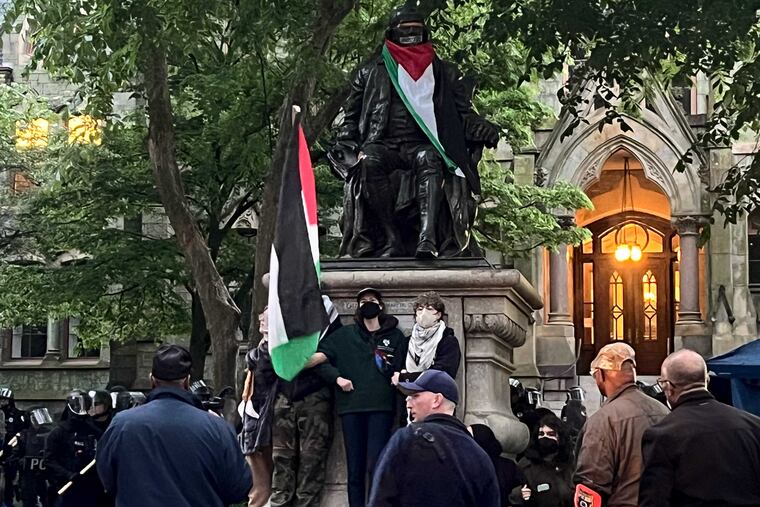Four Penn students suspended over pro-Palestinian demonstration
Two students were suspended for one semester, and two for a full year.

Four students involved in pro-Palestinian protests at the University of Pennsylvania have been suspended for their actions, a student group said.
Two students were suspended for one semester, and two for a full year. Two graduate students and two undergraduates received the discipline, which has not yet gone into effect and can still be appealed by the students.
The sanctions follow a 16-day encampment at the university that ended in May with police breaking up the encampment and 33 arrests, including nine student arrests.
The suspensions were handed down by the University of Pennsylvania’s disciplinary office, the Center for Community Standards and Accountability.
“Penn continues to review student conduct cases in connection with campus demonstrations this spring,” a university spokesperson said Tuesday. “The University affords due process to all students in accordance with our policies and recommends sanctions as appropriate on a case-by-case basis.”
The student suspensions come “after months of relentless university repression and targeted discipline against pro-Palestine students,” the group Freedom School for Palestine, a pro-Palestinian student group, said in a statement. “These students have been robbed of their access to education, income, work-study jobs, and health insurance as a result of this suspension.”
Hilah Kohen, a Penn graduate student in comparative literature and literary theory, received a one-year suspension for participation in pro-Palestinian activities, they said. They condemned Penn’s “dictatorial actions.”
Kohen, a Falk Fellow in Jewish Studies at the university, said the student movement’s “solidarity with Palestine is just one part of a global whole. ...Any ethical thinker must keep their focus on Palestinian resistance to genocide.”
Kohen was arrested when the encampment was broken up, and have also been banned from campus indefinitely by another university body. That ban still holds, they said.
Iman, a junior design undergraduate whose last name is being withheld because he is afraid for his safety, has been suspended for one semester. He was also arrested when police broke up the encampment, but criminal charges were later dropped for both him and Kohen. The reasons the university cited for suspending him were confusing, he said — they were “specific to building codes and a threat to student safety, even though my charges were completely dropped and there is no criminal case. I have no record whatsoever.”
There’s a history of protests at Penn, Iman said, but he believes the university is “cracking down specifically on pro-Palestinian activism on our campus.”
The suspension “shifts a lot of things for me,” Iman said. He lives off campus, so he still has a place to live, but will lose a stipend the university paid him for that housing.
Iman also had a work-study job throughout his time at Penn; “one of my jobs next semester for sure will not be able to hire me. I’m not even able to step on campus for any resources. I am losing access to health care through Penn’s insurance. I am losing many opportunities to look for jobs.”
The group said the university meant to “stifle speech and action, which threaten Penn’s interests.”
Last month, Penn released new guidelines on student protests; it specifically banned encampments, a move the student group characterized as a “crackdown on free speech” that “threatens to expand beyond this specific issue in order to erode the norms of university life.”
The student group called on Penn officials to drop the disciplinary cases.
Controversy began at Penn in September when the Palestine Writes literary festival, which critics said included speakers with a history of making antisemitic remarks, was held on campus. Tension escalated after Hamas’ Oct. 7 attack on Israel and Israel’s subsequent military response. Donors criticized the university for not doing enough to protect Jewish students, and then-Penn president Liz Magill resigned in December following a backlash over her congressional testimony about the university’s handling of antisemitic incidents.
Pro-Palestinian students and faculty said the university didn’t do enough to protect their rights, and the encampment was erected at the end of April.
The encampment members called for the university to disclose its financial holdings, divest from any investments in the war, and provide amnesty for pro-Palestinian students facing discipline over past protests.